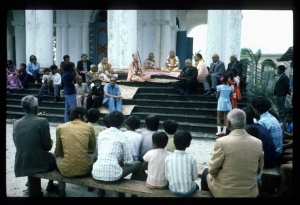CC Madhya 21.125: Difference between revisions
m (1 revision(s)) |
No edit summary |
||
| Line 1: | Line 1: | ||
{{ | [[Category:Sri Caitanya-caritamrta - Madhya-lila Chapter 21|C125]] | ||
<div style="float:left">'''[[Sri Caitanya-caritamrta|Śrī Caitanya-caritāmṛta]] - [[CC Madhya|Madhya-līlā]] - [[CC Madhya 21|Chapter 21: The Opulence and Sweetness of Lord Śrī Kṛṣṇa]]'''</div> | |||
<div style="float:right">[[File:Go-previous.png|link=CC Madhya 21.124|Madhya-līlā 21.124]] '''[[CC Madhya 21.124|Madhya-līlā 21.124]] - [[CC Madhya 21.126|Madhya-līlā 21.126]]''' [[File:Go-next.png|link=CC Madhya 21.126|Madhya-līlā 21.126]]</div> | |||
{{CompareVersions|CC|Madhya 21.125|CC 1975|CC 1996}} | |||
{{RandomImage}} | |||
==== TEXT 125 ==== | ==== TEXT 125 ==== | ||
<div | <div class="verse"> | ||
kāma-gāyatrī-mantra-rūpa, haya kṛṣṇera svarūpa, | :kāma-gāyatrī-mantra-rūpa, haya kṛṣṇera svarūpa, | ||
sārdha-cabbiśa akṣara tāra haya | :sārdha-cabbiśa akṣara tāra haya | ||
se akṣara ‘candra’ haya, kṛṣṇe kari’ udaya, | :se akṣara ‘candra’ haya, kṛṣṇe kari’ udaya, | ||
trijagat kailā kāmamaya | :trijagat kailā kāmamaya | ||
</div> | </div> | ||
| Line 14: | Line 18: | ||
==== SYNONYMS ==== | ==== SYNONYMS ==== | ||
<div | <div class="synonyms"> | ||
kāma-gāyatrī-mantra- | ''kāma-gāyatrī-mantra-rūpa''—the hymn known as Kāma-gāyatrī; ''haya''—is; ''kṛṣṇera svarūpa''—identical with Kṛṣṇa; ''sārdha-cabbiśa''—twenty-four and a half; ''akṣara''—syllables; ''tāra''—of that; ''haya''—are; ''se akṣara''—these syllables; ''candra haya''—are like the moon; ''kṛṣṇe''—Lord Kṛṣṇa; ''kari’ udaya''—awakening; ''tri-jagat''—the three worlds; ''kailā''—made; ''kāma-maya''—full of desire. | ||
</div> | </div> | ||
| Line 21: | Line 25: | ||
==== TRANSLATION ==== | ==== TRANSLATION ==== | ||
<div | <div class="translation"> | ||
“Kṛṣṇa, the Supreme Personality of Godhead, is identical with the Vedic hymn known as the Kāma-gāyatrī, which is composed of twenty-four and a half syllables. Those syllables are compared to moons that arise in Kṛṣṇa. Thus all three worlds are filled with desire. | “Kṛṣṇa, the Supreme Personality of Godhead, is identical with the Vedic hymn known as the Kāma-gāyatrī, which is composed of twenty-four and a half syllables. Those syllables are compared to moons that arise in Kṛṣṇa. Thus all three worlds are filled with desire. | ||
</div> | </div> | ||
__NOTOC__ | |||
<div style="float:right; clear:both;">[[File:Go-previous.png|link=CC Madhya 21.124|Madhya-līlā 21.124]] '''[[CC Madhya 21.124|Madhya-līlā 21.124]] - [[CC Madhya 21.126|Madhya-līlā 21.126]]''' [[File:Go-next.png|link=CC Madhya 21.126|Madhya-līlā 21.126]]</div> | |||
__NOTOC__ | |||
__NOEDITSECTION__ | |||
Revision as of 07:01, 9 September 2021

His Divine Grace
A.C. Bhaktivedanta Swami Prabhupada
A.C. Bhaktivedanta Swami Prabhupada
TEXT 125
- kāma-gāyatrī-mantra-rūpa, haya kṛṣṇera svarūpa,
- sārdha-cabbiśa akṣara tāra haya
- se akṣara ‘candra’ haya, kṛṣṇe kari’ udaya,
- trijagat kailā kāmamaya
SYNONYMS
kāma-gāyatrī-mantra-rūpa—the hymn known as Kāma-gāyatrī; haya—is; kṛṣṇera svarūpa—identical with Kṛṣṇa; sārdha-cabbiśa—twenty-four and a half; akṣara—syllables; tāra—of that; haya—are; se akṣara—these syllables; candra haya—are like the moon; kṛṣṇe—Lord Kṛṣṇa; kari’ udaya—awakening; tri-jagat—the three worlds; kailā—made; kāma-maya—full of desire.
TRANSLATION
“Kṛṣṇa, the Supreme Personality of Godhead, is identical with the Vedic hymn known as the Kāma-gāyatrī, which is composed of twenty-four and a half syllables. Those syllables are compared to moons that arise in Kṛṣṇa. Thus all three worlds are filled with desire.